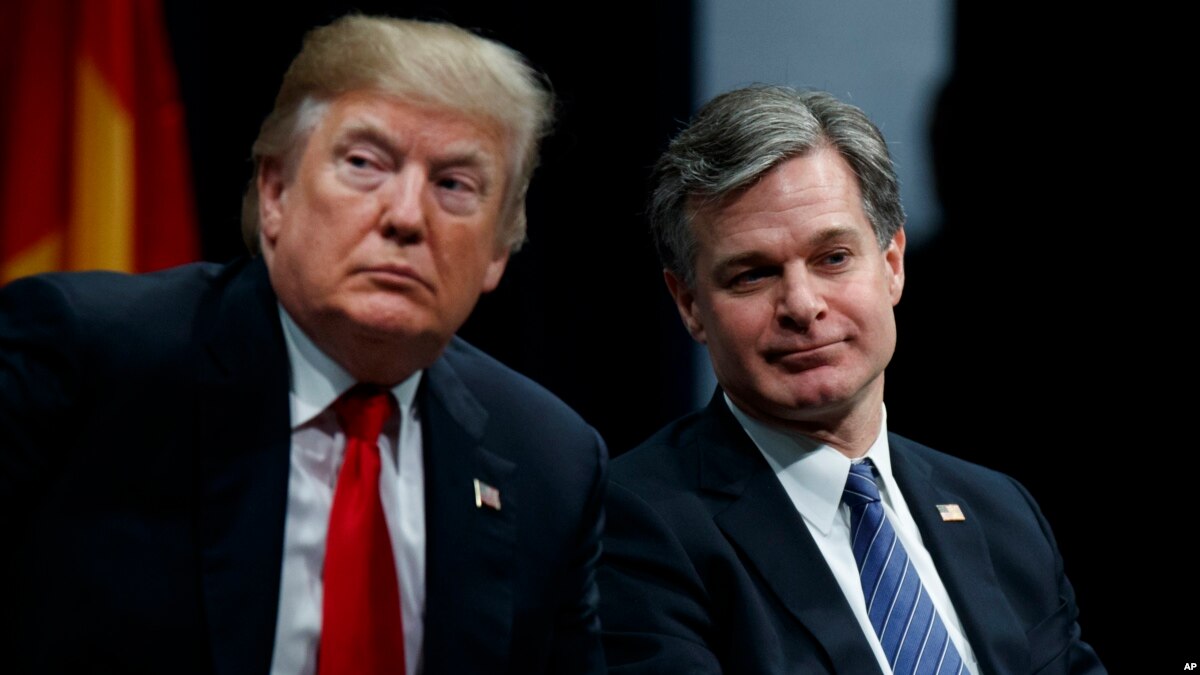
U.S. President Donald Trump is at odds with both the FBI and the Justice Department over whether to release a classified memo alleging that top law enforcement officials were biased against the president.
The "Nunes memo," named for the Republican congressman who drafted it in recent weeks, allegedly includes details about Justice Department efforts ahead of the 2016 U.S. presidential election to seek authority from the Federal Intelligence Surveillance Court to monitor a Trump campaign adviser's possible contacts with Russian operatives.
Trump has said he favors release of the memo. The White House could release it as soon as Thursday.
But in a highly unusual public standoff with a U.S. president, the Federal Bureau of Investigation, led by Trump's appointee, Christopher Wray, said the bureau had "grave concerns" about the accuracy of the memo. Wray and Deputy Attorney General Rod Rosenstein, in a meeting earlier in the week with Trump's chief of staff John Kelly, both implored the White House to keep the memo secret.
Meanwhile, the top Democrat on the House Intelligence panel, Congressman Adam Schiff of California, said late Wednesday the committee's Republicans altered the classified memo before sending it to the White House instead of sending the version they had shown to lawmakers and approved for release in a party-line vote.
Schiff said in a letter to committee Chairman Devin Nunes, a California Republican and Trump supporter, that Democrats had discovered that the memo had undergone "material changes" that committee members had not been able to review or approve. He called the situation "deeply troubling."
"While the majority's changes do not correct the profound distortions and inaccuracies in your document, they are nonetheless substantive," Schiff said.
A Nunes spokesman responded with a statement saying the version sent to the White House had only "minor edits" and that Democrats were trying to distract from the "abuses detailed in the memo."
"In its increasingly strange attempt to thwart publication of the memo, the Committee Minority is now complaining about minor edits to the memo, including grammatical fixes and two edits requested by the FBI and by the Minority themselves," the spokesman said.
Nunes called the FBI's objections to release of the memo "spurious."
"The FBI is intimately familiar with ‘material omissions' with respect to their presentations to both Congress and the courts, and they are welcome to make public, to the greatest extent possible, all the information they have on these abuses," Nunes said in a statement. "Regardless, it's clear that top officials used unverified information in a court document to fuel a counterintelligence investigation during an American political campaign. Once the truth gets out, we can begin taking steps to ensure our intelligence agencies and courts are never misused like this again."
The memo concerns an application by U.S. law enforcement authorities to the surveillance court to monitor contacts Trump campaign adviser Carter Page may have had with Russian operatives leading up to the election. Some Republicans say the surveillance request may have been mishandled and suggest the episode could undermine special counsel Robert Mueller's investigation of Russian meddling in the election and whether Trump obstructed justice to try to impede the probe.
Prior to issuing his letter Wednesday night, Schiff said in an op-ed article in The Washington Post that the decision to release the memo crossed a "dangerous line."
"Doing so without even allowing the Justice Department or the FBI to vet the information for accuracy, the impact of its release on sources and methods, and other concerns was, as the Justice Department attested, "extraordinarily reckless," he wrote.
"But it also increases the risk of a constitutional crisis by setting the stage for subsequent actions by the White House to fire Mueller or, as now seems more likely, deputy attorney general Rod J. Rosenstein," Schiff said. Schiff said such a scenario "would echo the 1973 Saturday Night Massacre," former President Richard Nixon's purge of officials investigating corruption in his White House.
The memo has become a flashpoint in politically divided Washington, with some Republicans increasingly voicing complaints about Mueller's months-long investigation and claiming that some Justice Department officials have worked to undermine Trump's presidency.
Trump has repeatedly said there was "no collusion" between his campaign and Russia. Last week, he said there also was "no obstruction" of the Russia investigation.
Read More Trump at Odds with FBI, Justice Dept. Over Release of Classified Russia Memo : http://ift.tt/2DT8guu/cloudfront-us-east-1.images.arcpublishing.com/bostonglobe/VNG7YMZTRWJ5WBFTJ5NVETPCQI.jpg)
No comments:
Post a Comment